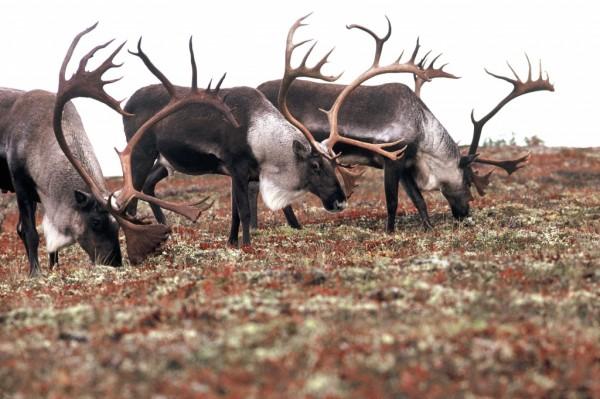The great Porcupine Caribou herd ranges over Alaska’s Arctic National Wildlife Refuge, and two Canadian national parks, spending much of its life trying to avoid bites from millions of mosquitoes. The herd heads each year to calve on the coastal plain of the Beaufort Sea where winds blow away bugs.
Now, a new study by Dartmouth College in New Hampshire warns that global warming will increase the mosquito population in the Arctic and expand the torment of the caribou. The news is likely positive for migratory birds, which fly north to such places as Teshekpuk Lake to feast on the insects that drive two and four-legged creatures crazy.

Caribou in northern Alaska. They are often on the move, seeking snowfields or windy ridges or coastlines in order to get away from biting mosquitoes. But a new study predicts that mosquito populations will soar with global warming.
The Dartmouth researchers did their field studies in western Greenland, where caribou populations have been in decline.
They found that for every 1 degree Celsius rise in temperature, Greenland mosquitoes need 10 percent less time to emerge as adults and seek sources of blood. A 2 degree Celsius rise in temperature means a rise of 53 percent in survivability.
“More mosquitoes is not necessarily good news for caribou,” Lauren Culler, lead researcher in the study, told CBC News. “In response to insect harassment, caribou spend a lot of time running around seeking insect free areas. So they’ll run to the top of a windy ridge or run into a snow patch where they can aboud being bitten by mosquitoes . . .”
“When caribou are spending more time running away from insects, they’re spending less time eating high quality food and that food is really important for their ability to successfully raise their calves.”
The study verges on what has been a major American environmental debate for the past 35 years.
The oil industry, and its client Alaska politicians, covet the coastal plain of the Arctic National Wildlife Refuge. They want to drill for oil. Two Bush administrations have promoted drilling, as did 2008 Republican vice presidential candidate Alaska Gov. Sarah Palin with her, “Drill baby, drill” mantra.
Yet, the coastal plain is vital to survival of the Porcupine heard, which numbers more than 100,000 animals. Protected by breezes off the Beaufort Sea, somewhat free of mosquitoes, this is where they give birth.
The native community of Arctic Village, far inland, has mobilized opposition to oil drilling on grounds that its food supply — the Porcupine herd — would be endangered by oil rigs and haul roads on the coastal plain.
The Dartmouth study would indicate that Arctic caribou will need bug-free places more than ever. The Arctic is warming at twice the rate of the rest of the world.
